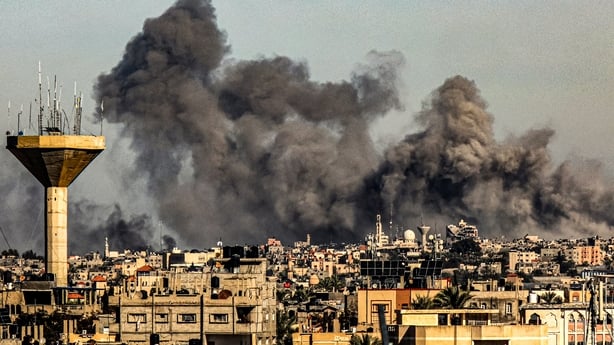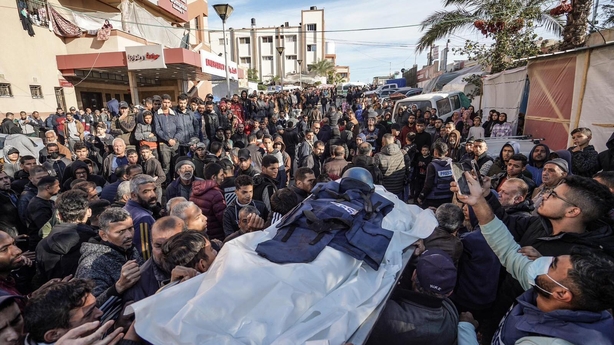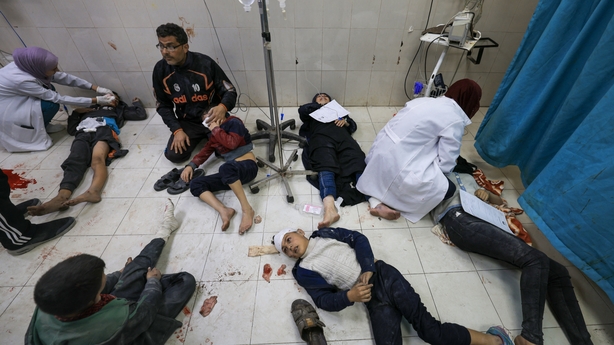The Israeli army has said that three hostages mistakenly killed by soldiers carried a white flag and cried for help in Hebrew.
Families of other hostages held in Gaza called on the Israeli government to stop fighting and make a deal to secure their release.
Yotam Haim, Alon Shamriz and Samer El-Talalqa, all in their 20s, were shot during operations in Gaza City yesterday, sparking protests in Israel.
They were among about 250 people taken hostage during Palestinian militant group Hamas's 7 October attacks in Israel, which killed around 1,140 people, mostly civilians, according to Israeli figures.
Vowing to destroy Hamas and bring back the hostages, Israel launched a relentless bombardment and ground offensive that has left much of Gaza in ruins.
The territory's Hamas government says the war has killed at least 18,800 people, mostly women and children.

Israeli army spokesman Daniel Hagari said that during fighting in the Shejaiya district of Gaza City, troops "mistakenly identified three Israeli hostages as a threat and as a result, fired toward them and the hostages were killed".
An army official said the hostages were all "without shirts" and had "a stick with a white cloth on it", but a soldier felt threatened and opened fire.
"Two are killed immediately, one is injured and runs back into the building," the official said, adding that the soldiers heard "a cry for help... in Hebrew".
Despite a ceasefire order, "there's another burst of fire towards the third figure and he also dies".
The official called it a "tragic" event and "very hard day" but said the troops had faced "intense combat in the area".
Hundreds gathered in Tel Aviv to call on the government to secure the release of 129 hostages still held in Hamas-ruled Gaza.
Israel has previously said eight other hostages had died.
"We only receive dead bodies. We want you to stop the fight and start negotiations," Noam Perry, daughter of hostage Haim Perry, said at an event organised by the Hostages and Missing Families Forum.
"We feel like we're in a Russian roulette game," said Ruby Chen, father of 19-year-old soldier Itai, who is among the captives.
"They explained to us first that the ground operation would bring back the abductees," he said.
"It doesn't work. Because since then, abductees have been seen returning, but not so much alive. It's time to change this assumption," he said.
Netanyahu hints new hostage negotiations under way
Meanwhile, Israeli Prime Minister Benjamin Netanyahu has appeared to hint that new negotiations are under way to recover hostages held by Hamas, after his chief of Mossad intelligence met the prime minister of Qatar, a country mediating in the conflict.
In a televised press conference, Mr Netanyahu called the Gaza conflict an existential war that must be fought until victory, despite pressure and costs, and said the territory would be demilitarised and under Israeli security control.
He said Israel's offensive in Gaza had helped clinch a partial hostage-release deal in November.
"The instruction I am giving the negotiating team is predicated on this pressure, without which we have nothing," he said.
Mr Netanyahu spoke after the head of Israel's Mossad spy agency David Barnea met Qatari Prime Minister Mohammed bin Abdulrahman Al Thani in Europe late last night, according to a source with knowledge of the matter, and attention turned to a possible new Gaza truce and a prisoner and hostage deal.
Mr Netanyahu sidestepped a question about the meeting, saying he would not divulge information to Hamas.
He said Israel had requests for a ceasefire and to remove troops in Gaza talks, but would not do so.
Mr Netanyahu said that the deaths of the three hostages were heart-breaking, but "military pressure is necessary" to bring the other captives home.
"It broke my heart. It broke the whole nation's heart," Mr Netanyahu said while adding: "With all the deep sorrow, I want to clarify: the military pressure is necessary both for the return of the kidnapped and for achieving victory over our enemies."
'He died hungry'
In November, a one-week truce saw more than 100 hostages freed in exchange for Palestinians held in Israeli jails, but fighting has since resumed.
The hostages' deaths have heightened already fierce scrutiny of how Israel is conducting its ground and air assault in Gaza.
The White House, which provides billions of dollars in military aid to Israel, has voiced growing concern over mounting civilian deaths.
"I want them to be focused on how to save civilian lives - not stop going after Hamas, but be more careful," said US President Joe Biden this week.
News platform Axios said the director of Israeli intelligence agency Mossad, David Barnea, was due to meet this weekend in an unspecified location in Europe with Qatari Prime Minister Sheikh Mohammed bin Abdulrahman Al Thani.
Axios said the officials would discuss resuming negotiations for a deal to secure the release of the remaining hostages.
We need your consent to load this rte-player contentWe use rte-player to manage extra content that can set cookies on your device and collect data about your activity. Please review their details and accept them to load the content.Manage Preferences
Read more about the Israel-Hamas conflict
In Gaza, fierce fighting continued.
The Israeli army has said that it had raided two schools in Gaza City saying they were Hamas hiding place.
The funeral was held in Gaza of Samer Abu Daqqa, a journalist with television network Al Jazeera killed by an Israeli strike on Khan Yunis yesterday. His colleague Wael al-Dahdouh was wounded.
"He died hungry, they died with nothing to eat, with hunger. Oh my darling," said his grieving mother, Umm Maher.
More than 60 journalists and media staff have died since the war began, according to the Committee to Protect Journalists.
"We were reporting, we were filming, we had finished and we were with the civil defence, but when we were on the way back, they hit us with a missile," said Mr Dahdouh, who lost his wife, two children and grandchild earlier in the war.

Aid crossing opens
In the face of growing international pressure, Israel announced a "temporary measure" allowing aid to be delivered directly to Gaza through the Kerem Shalom border crossing.
A World Health Organization representative said the decision was "very good news".
Since the war began, a trickle of aid has squeezed into Gaza through the Rafah crossing with Egypt.
Aid agencies have said the volume is nothing like enough to help the estimated 1.9 million Gazans displaced by the war.
In the Israeli-occupied West Bank, eight Palestinians were arrested in Israeli raids, Palestinian news agency Wafa reported.
The war continues to be felt across the Middle East, with fears of a new front opening on Israel's northern border with Lebanon, where it has exchanged regular fire with militants, mainly the powerful Iran-backed Hezbollah.
The Israeli army said a soldier was killed and two others wounded in the Margaliot area on the Lebanese border.
A spokesperson confirmed to AFP the casualties were caused by a "hostile aircraft".
The conflict has also caused major disruption to the key Red Sea shipping lane between Asia and Europe, with two more major firms announcing they were redirecting their vessels following repeated attacks by Yemeni rebels allied with Hamas.
The action by Mediterranean Shipping Company (MSC) and CMA CGM follows similar moves on Friday by Maersk and Hapag-Lloyd.

It comes after Yemen's Iran-backed Huthi rebels launched repeated attacks on passing vessels in recent days.
The rebels also launched a wave of 14 one-way attack drones at Israel on Saturday, all of which were "shot down with no damage to ships in the area or reported injuries", the US military's Central Command said.
US National Security Advisor Jake Sullivan met Palestinian president Mahmoud Abbas in Ramallah yesterday.
Mr Abbas said Gaza must remain an "integral part" of a future Palestinian state.
But Mr Abbas's Palestinian Authority (PA), which has partial administrative control in the West Bank only, is deeply unpopular with Palestinians and has been further weakened by the war.
Washington still hopes the PA can resume control of Gaza as part of a renewed push for a two-state solution to the Israeli-Palestinian conflict - a solution that Mr Netanyahu has resolutely opposed.

